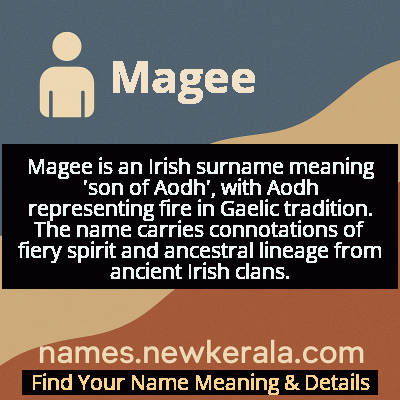Magee Name Meaning & Details
Origin, Popularity, Numerology Analysis & Name Meaning of Magee
Discover the origin, meaning, and cultural significance of the name MAGEE. Delve into its historical roots and explore the lasting impact it has had on communities and traditions.
Name
Magee
Gender
Male
Origin
Irish
Lucky Number
4
Meaning of the Name - Magee
Magee is an Irish surname meaning 'son of Aodh', with Aodh representing fire in Gaelic tradition. The name carries connotations of fiery spirit and ancestral lineage from ancient Irish clans.
Magee - Complete Numerology Analysis
Your Numerology Number
Based on Pythagorean Numerology System
Ruling Planet
Uranus (Rahu)
Positive Nature
Strong sense of order, loyal, practical, and disciplined.
Negative Traits
Stubborn, overly serious, rigid, and prone to feeling restricted.
Lucky Colours
Blue, gray.
Lucky Days
Saturday.
Lucky Stones
Blue sapphire.
Harmony Numbers
1, 7, 8.
Best Suited Professions
Managers, engineers, accountants, organizers.
What People Like About You
Dependability, discipline, practicality.
Famous People Named Magee
Barry Magee
Athlete
New Zealand Olympic bronze medalist in marathon at the 1960 Rome Olympics
John Magee
Poet and Clergyman
Author of the famous poem 'High Flight' and Episcopal Bishop of Pittsburgh
Patrick Magee
Actor
Irish actor known for his collaborations with Samuel Beckett and role in 'A Clockwork Orange'
William Magee
Physician and Politician
Irish physician who served as MP for Drogheda and advocated for Catholic emancipation
Name Variations & International Equivalents
Click on blue names to explore their detailed meanings. Gray names with will be available soon.
Cultural & Historical Significance
The name's journey through history mirrors Ireland's broader narrative—from Gaelic dominance to English influence, through periods of political struggle and mass emigration. During the 17th and 18th centuries, many Magee families participated in the Ulster Plantation migrations to North America, establishing new roots while maintaining cultural connections. The name became part of the Irish diaspora story, representing both the challenges of displacement and the resilience of cultural identity. Today, Magee remains a proud marker of Irish heritage worldwide, symbolizing the enduring connection between modern descendants and their ancestral homeland while adapting to diverse global contexts.
Extended Personality Analysis
Those carrying the Magee surname often exhibit personality traits that reflect both the name's fiery etymology and its historical context. There's typically a strong sense of determination and resilience—qualities that served Irish families well through centuries of political and economic challenges. This manifests as practical problem-solving ability combined with emotional depth and cultural pride. Many with this name demonstrate natural leadership tendencies and a protective instinct toward family and community, echoing the clan-based origins of the surname.
Creativity and intellectual curiosity are also commonly associated with the Magee name, as evidenced by the numerous writers, artists, and thinkers who have borne it. There's often a balance between traditional values and progressive thinking—respect for heritage coupled with adaptability to changing circumstances. The name suggests someone who values authenticity and has a strong moral compass, while also possessing the warmth and social intelligence that facilitates building meaningful relationships across diverse settings. This combination of strength and sensitivity creates individuals who can both lead and connect with others effectively.
Modern Usage & Popularity
In contemporary usage, Magee maintains its position as a respected Irish surname while increasingly appearing as a distinctive first name, particularly in Irish-American and diaspora communities seeking meaningful cultural connections. The name enjoys moderate but consistent popularity in Ireland and regions with significant Irish heritage populations. Recent decades have seen a renewed appreciation for Gaelic names, contributing to Magee's steady presence in birth records and professional directories. It's frequently chosen by parents wanting a name that honors Irish roots while offering uniqueness in multicultural settings. The surname appears across diverse fields from technology to entertainment, demonstrating its adaptability while maintaining historical resonance. Digital globalization has also facilitated connections among Magee families worldwide, creating new networks that reinforce the name's cultural significance while embracing modern identity formations.
Symbolic & Spiritual Meanings
Symbolically, Magee represents the eternal flame of Irish heritage—a fire that has been carried across generations and continents while never being extinguished. The name's connection to 'Aodh' (fire) metaphorically signifies passion, transformation, and the creative spark that has characterized Irish contributions to global culture. It embodies the journey from ancient clan territories to worldwide diaspora, representing both deep roots and far-reaching branches. The name carries connotations of resilience—the ability to withstand historical challenges while maintaining cultural integrity and family bonds. Magee symbolizes the bridge between tradition and progress, honoring ancestral legacy while embracing innovation and new opportunities. It represents the enduring light of identity that guides individuals while connecting them to a larger historical narrative and cultural community.

